
Villa Oplontis was another stop on the Naples leg of our trip. In total we spent five nights and four full days in the Naples area. We have spent time in Naples before to visit Vesuvius, Pompeii, and the Museo Acheological Nazionale di Napoli. This time we based ourselves in Cuma at Villa Giulia and each day we went out to visit something new. Day 1 at Il Parco Archeologico di Cuma and Solfatara, Day 2 at the Scavi di Ercolano (Heculaneum), Day 3 at Reggia di Caserta, and for the final day we decided on Villa Oplontis. We drove to every location by car.
Villa Oplontis, also called Villa Poppea, is a Roman villa located in the modern town of Torre Annunziata. The alternate name comes from the fact that the villa was used by Emperor Nero’s second wife Poppea Sabina. The villa was a covered by the eruption of 79 AD. When we say in, the villa is really in and under the town as Herculaneum is. So getting there can be tricky as well as parking. We parked a few blocks from the entrance in a car/bus park that was near the train tracks.
Oplontis is where the Roman wall painting and its complexity really hit us full force. Maybe because we were there alone and could really appreciate it. (During this early week visit, we saw 3 other people at the villa and only for a little bit – so hardly crowded.) Or, maybe it was we truly felt in a domus (home or household) and the composition in the paintings (particularly, use of perspective) suddenly seemed way ahead of their time. But what did the use of the perspective painting, where you the viewer is looking toward temples and landscapes, all mean? While touring we didn’t have that much of a clue and the brochure (example shown below) that you get with your ticket doesn’t shed much light on it. In fact, we sort took the standard interpretation that the paintings were largely decorative. A while after visiting we came across the wonderful web site called the The False - Door: dissolution and becoming in Roman wall-painting. In that web site, the author introduces the following ideas:
- Roman wall paintings are typically viewed outside of their normal context; as a viewer we understand them through many filters like film, books, or cultural and religious biases.
- “…we are increasingly subjected to a version of Roman society that is more caricature than characterisation. The caricature uses wall-painting per se as evidence of luxury that is symptomatic of the owner’s hedonistic desire to imitate the luxurious trappings of Greek and Hellenistic culture.” Intro
- Many of the rooms at Oplontis and elsewhere display false-door imagery “denoting public and private communion with metaphysical worlds.” Chapter 8
The last point helps you start to understand the depiction of doors, gates, low walls beyond which are otherworldly landscapes. When you think about the fact that these wall paintings were in houses (okay, likely more well-to-do houses) and that we always learned (okay maybe just us) that perspective was invented in the Renaissance, it makes these depictions all the more incredible. In fact, the author of the False-Door says “[t]he fact that the majority of the wall-paintings evolved within homes and not temples or palaces, makes their evolution unique within the history of art.” Intro
We highly recommend visiting Villa Oplontis. Next time we are in the area, we’ll be sure to make stops like Villa Boscoreale, Villa Arianna, and Villa S.Marco.
Villa Oplontis Brochure

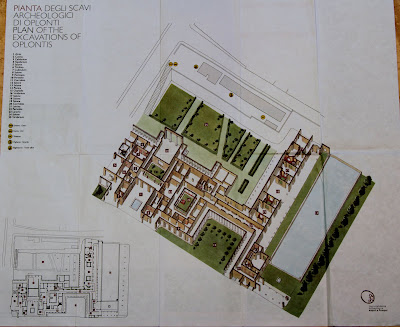
View On Villa Oplontis From the Entry

Peacock and Mask in Salone (Room 5)
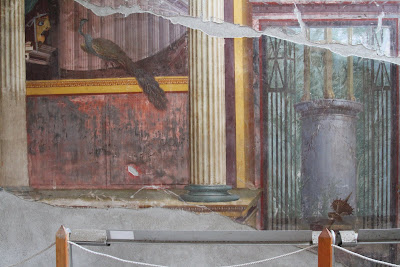
Triclinio (Room 6)
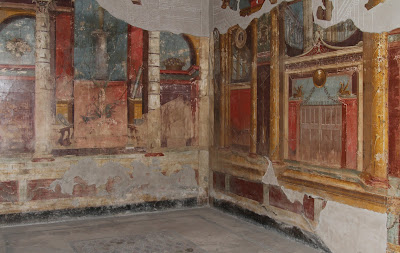
Triclinio Bowl of Fruit

Triclinio Food Under Wrap

Calidarium (Room 3)
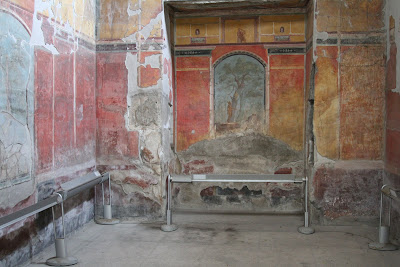
Atrium (Room 1)


Peristyle (Room 10)
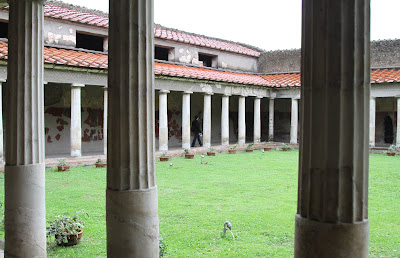
Viridarium (Room 16)



Design Element In Corridor Along the Piscina

Jars in Villa Oplontis

Small Peristyle (Room 22)
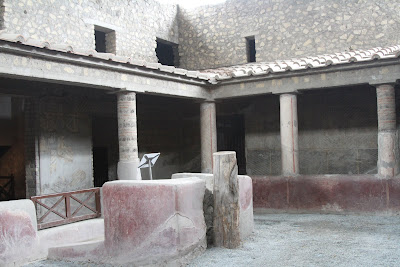
No comments:
Post a Comment
All comments are moderated. If your comment doesn't appear right away, it was likely accepted. Check back in a day if you asked a question.